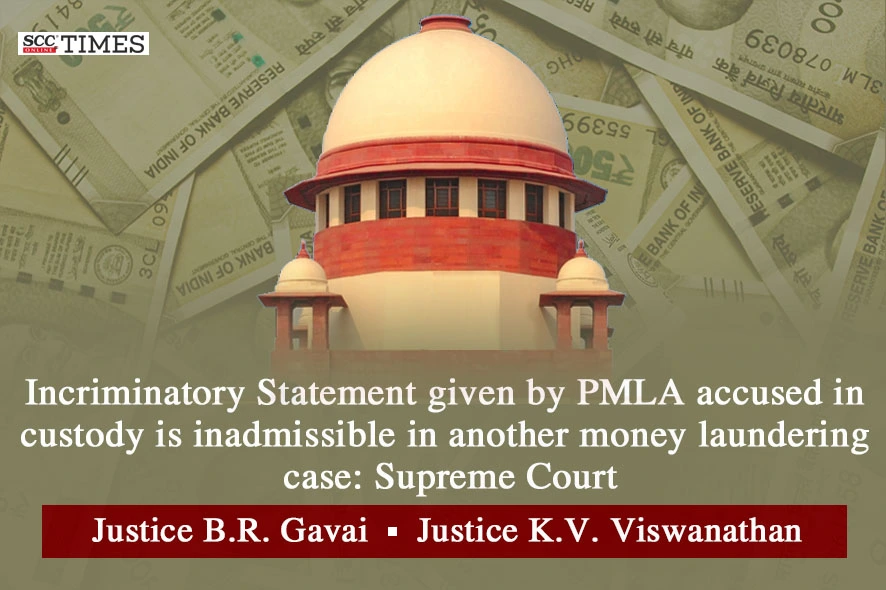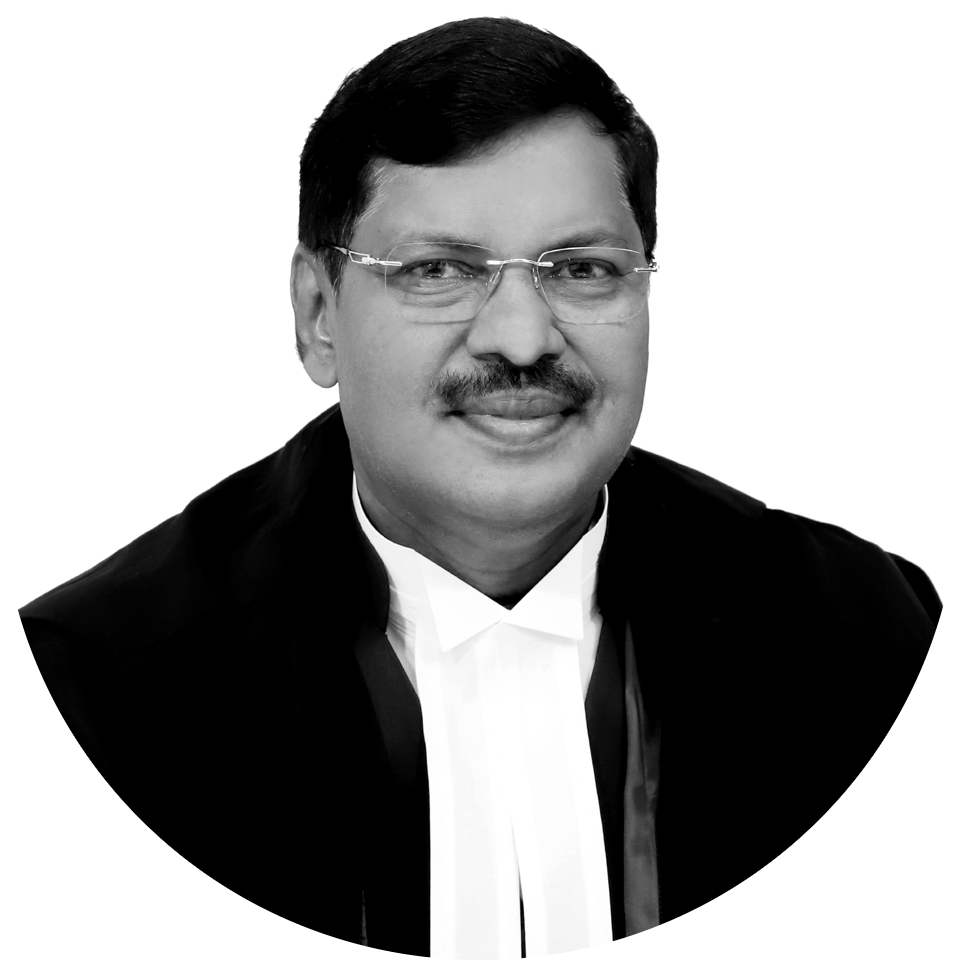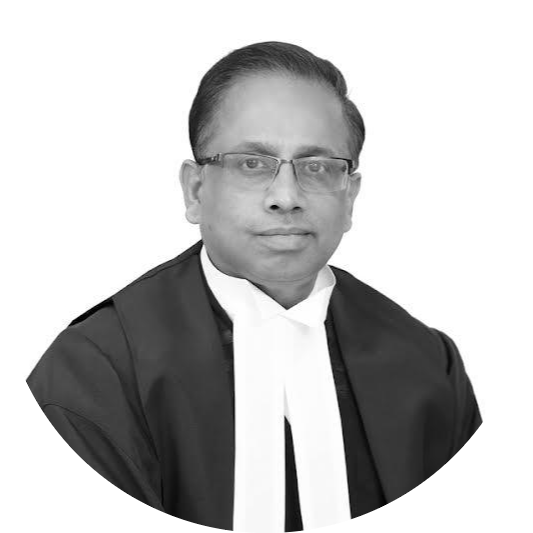Supreme Court: In an appeal filed against the Judgment passed by the Jharkhand High Court, wherein the Court dismissed the bail application of the accused for the offence under Sections 3 and 4 of the Prevention of Money Laundering Act, 2002 (‘PMLA’), the division bench of BR Gavai and KV Viswanathan, JJ. held that a statement given by an accused, while under custody in a case under the PMLA, to investigating officers of the Enforcement Directorate (‘ED’) incriminating oneself in another money laundering case would be inadmissible in evidence.
Background:
The accused was taken into custody on 11-08-2023 as it was alleged that he conspired with the other accused persons, in the acquisition of proceeds of crime in the form of landed property. However, he was already in custody from 25-08-2022 in another money laundering case. His application for bail was rejected by the Special Judge on 20-09-2023. He preferred a bail application before the High Court. The High Court declined bail to the accused. Aggrieved, he filed the present appeal.
Issue:
When a person is in judicial custody/custody in another case investigated by the same Investigating Agency, whether the statements recorded) for a new case in which his arrest is not yet shown, and which are claimed to contain incriminating material against the maker, would be admissible under Section 50 PMLA?
Analysis and Decision:
The Court took note of the twin conditions for bail, mentioned under Section 45 PMLA, and said that certain conditions are to be satisfied. The principle that, “bail is the rule, and jail is the exception” is only a paraphrasing of Article 21 of the Constitution of India. Liberty of the individual is always a Rule and deprivation is the exception. Deprivation can only be by the procedure established by law, which must be valid. Section 45 of PMLA by imposing twin conditions does not re-write this principle to mean that deprivation is the norm and liberty is the exception. All that is required is that in cases where bail is subject to the satisfaction of twin conditions, those conditions must be satisfied.
The Court remarked that “Article 21 being a higher constitutional right, statutory provisions should align themselves to the said higher constitutional edict”.
In the present matter, the Court held that the statement of the accused herein, was hit by Article 20(3) of the Constitution, since he had given the statement whilst in judicial custody pursuant to another proceeding instituted by the same investigating agency.
The Court pointed out that the accused has been in judicial custody from 25-08-2022 in connection with another ECIR, and while in judicial custody his arrest was shown in the current ECIR. His statements were recorded from 03-08-2023 onwards.
The bench noted that while the accused was under custody in connection with Enforcement Case Information Report (‘ECIR’), his statements were recorded by the ED officers in connection with the present ECIR.
The Court took note of Vijay Madanlal Choudhary v. Union of India, 2022 SCC OnLine SC 929 wherein it was held that statements recorded by ED officers under Section 50 of the PMLA are admissible in evidence. Further, it was held that whether the protection of Section 25 of the Evidence Act 1872 (confessions to police inadmissible in evidence) is available to an accused facing prosecution for offences under the PMLA must be decided on a case-to-case basis.
The Court held that that the statement of the accused if to be considered as incriminating against the maker, will be hit by Section 25 of the Evidence Act since he has given the statement whilst in judicial custody, pursuant to another proceeding instituted by the same Investigating Agency. The Bench further added that as he was taken from the judicial custody to record the statement, it would be a travesty of justice to render the statement admissible against the accused.
The Court remarked that the accused cannot be told that after all while giving this statement:- “you were wearing a hat captioned ‘ECIR 2023’ and not the hat captioned ‘ECIR 2022’”
The Court held that when an accused is under custody under PMLA, irrespective of the case of which he is under custody, any statement under Section 50 to the same investigating agency is inadmissible against the maker, as the person in custody pursuant to the proceedings investigated by the same investigating agency is not a person who can be considered as one operating with a free mind. It would be extremely unsafe to render such a statement admissible against the maker as such a course of action would be contrary to all canons of fair play and justice.
In view of Section 50 PMLA and keeping the salutary principle of Article 21 in mind, the Court held that since the words ‘procedure established by law’ occurring in Article 21 has to be a reasonable and valid procedure, the statement of the accused under Section 50 cannot be read upon in the present case even though the accused was at that point in custody in some other case. The Court also held that a person in judicial custody, not being a free person, cannot be summoned by the ED. The ED must obtain the permission of the Court which has remanded him to custody in the other case to record the statement of the accused in custody.
Thus, the Court set aside the impugned order and directed the Trial Court to release the accused on bail in connection with the present case on furnishing bail bonds for a sum of Rs. 5 lakh with 2 sureties of the like amount. The Court also directed the accused to surrender his passport to the Trial Court and to report to the Investigating Officer every Monday and Thursday between 10 and 11 A.M.
CASE DETAILS
|
Citation: Appellants : Respondents : |
Advocates who appeared in this case For Petitioner(s): For Respondent(s): |
CORAM :









